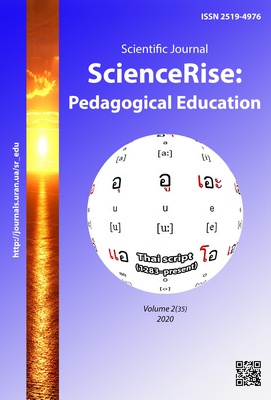Методика дослідження явища синонімії родинних лексем на засадах комунікативно-діяльнісного підходу
DOI:
https://doi.org/10.15587/2519-4984.2020.199298Ключові слова:
комунікативна, лексична компетентність, комунікативно-діяльнісний підхід, родинна лексика, родинні номінації, синоніміяАнотація
У статті здійснено теоретичний аналіз методичної, педагогічної, психологічної, фахової та ін. літератури з проблеми дослідження явища синонімії родинних лексем і методики їхнього вивчення на засадах комунікативно-діяльнісного підходу. Визначено початковий рівень володіння такими поняттями як «родинна лексика» та «синонімія родинних лексем», з’ясовано практичні навички побудови власних висловлювань, здатності користуватися синонімами-відповідниками в творчому контексті. Розроблено систему вправ, яку направлено на розвиток емпатії в класному колективі, дружності та здатності глибше розуміти один одного, вміти добирати синоніми до вказаних одиниць, пояснювати їхнє лексичне значення. Запроваджено ряд вправ психолого-реабілітаційного та регенеруючого характеру в колі класної родини, реалізовано розвиток навичок прощати та просити вибачення у ближнього.
Серед умов, які забезпечували результативність комунікативно-діяльнісного підходу визначено створення сприятливого психологічного мікроклімату колективу, комфортність та прийняття кожного його члена зокрема. Здійснено підтримку гуманності та толерантності в ставленні до учасників навчального процесу і кожної особистості окремо. Реалізовано систему міжпредметних зв’язків у контексті певного алгоритму дій, як-от: до, перед, безпосередньо, та після виконання вправ. Етап саморефлексії тісно взаємопов’язано з мовним матеріалом на уроці. Звернено увагу на обговорення семантичних відтінків синонімів родинної лексики та варіантів їхнього використання в певних ситуаціях асоціативних експериментів. Запропоновано творчий підхід до використання ІТ у контексті дослідження синонімії родинної лексики на засадах комунікативно-діяльнісного підходу
Посилання
- Wierzbicka, A. (1997). Understanding Cultures Through Their Key Words: English, Russian, Polish, German, Japanese. New York: Oxford University Press, 317.
- Bohn, R. (2000). Probleme der Wotschatzarbeit. München: Langenscheidt, 192.
- Schneider, W. (2008). Speak German!: Warum Deutsch manchmal besser ist. Hamburg: Rowohlt, 192.
- Matsko, L. I., Hruba, T. L., Semenoh, O. M., Symonenko, T. V. (2017). Ukrainska mova 10-11 klasy. Prohrama dlia profilnoho navchannia uchniv zahalnoosvitnikh navchalnykh zakladiv. Filolohichnyi napriam, profil – ukrainska filolohiia. Kyiv: Proekt. Ministerstvo nauky i osvity Ukrainy, 94.
- Horoshkina, O. M. (2013). Rol rytoryky v komunikatyvnii pidhotovtsi uchniv. Naukovi zapysky Natsionalnoho universytetu «Ostrozka akademiia». Seriia: Filolohichna, 40, 137–140.
- Neshcheret, O. I. (2016). Psykholohiia movlennievoi diialnosti: osnovy psykholohinhvistychnykh znan. Nizhyn: NDU im. M. Hoholia, 200.
- Varzatska, L. (2011). Dydaktychni tsili, typy, struktura urokiv ukrainskoi movy i movlennia. Dyvoslovo, 6, 9–14.
- Pentyliuk, M. I. (2010). Vykhovnyi potentsial simi: tradytsii, realii ta perspektyvy. Ridna shkola, 12, 74–75.
- Pentyliuk, M. I. (2015). Culture of professional communication of future professionals. Naukovyi visnyk Mykolaivskoho yftsionalnoho universytetu imeni V. O. Sykhomlynskoho. Seria: Pedahohichni nauky, 14, 144–151.
- Zatvorniuk, O. M. (2018). Psykholohiia simi. Kyiv: Vydavnychyi Dim «Slovo», 184.
- Matsiuk, Z., Stankevych, N. (2011). Ukrainska mova profesiinoho spilkuvannia. Kyiv: Karavela, 352.
- Manakin, V. M. (2012). Mova i mizhkulturna komunikatsiia. Kyiv: Akademiia, 288.
- Kaplinskyi, V. V. (2017). Metodyka vykladannia u vyshchii shkoli. Kyiv: KNT, 225.
- Ponomariv, O. D. (2012). Ukrainske slovo dlia vsikh i kozhnoho. Kyiv: Lybid, 360.
- Holub, N., Protsenko, L. (2016). Metodyka navchannia leksykolohii ta frazeolohii v shkilnomu kursi ukrainskoi movy. Nizhyn: NDU im. M. Hoholia, 223.
##submission.downloads##
Опубліковано
Як цитувати
Номер
Розділ
Ліцензія
Авторське право (c) 2020 Tetiana Rudiuk

Ця робота ліцензується відповідно до Creative Commons Attribution 4.0 International License.
Наше видання використовує положення про авторські права Creative Commons CC BY для журналів відкритого доступу.
Автори, які публікуються у цьому журналі, погоджуються з наступними умовами:
1. Автори залишають за собою право на авторство своєї роботи та передають журналу право першої публікації цієї роботи на умовах ліцензії Creative Commons CC BY, котра дозволяє іншим особам вільно розповсюджувати опубліковану роботу з обов'язковим посиланням на авторів оригінальної роботи та першу публікацію роботи у цьому журналі.
2. Автори мають право укладати самостійні додаткові угоди щодо неексклюзивного розповсюдження роботи у тому вигляді, в якому вона була опублікована цим журналом (наприклад, розміщувати роботу в електронному сховищі установи або публікувати у складі монографії), за умови збереження посилання на першу публікацію роботи у цьому журналі.









